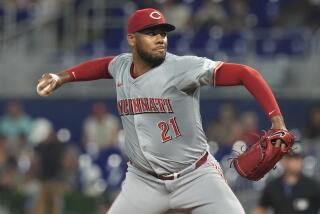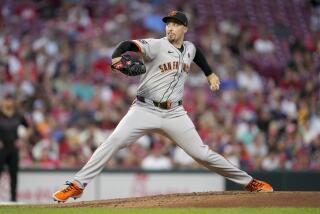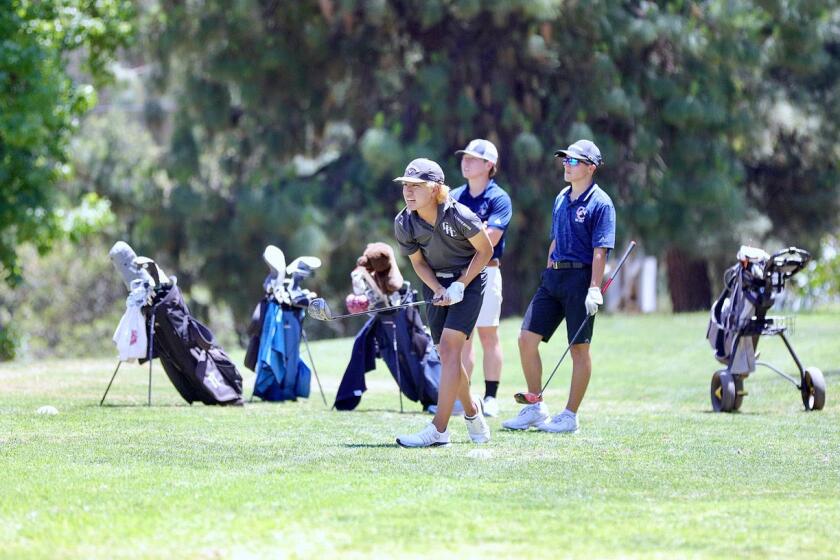THE BIG INNING : Reds Get Record 16 Hits, Score 14 Runs in the First
- Share via
It all started innocently enough. The Cincinnati Reds’ leadoff hitter, Mariano Duncan, walked and stole second base. Luis Quinones bunted and beat it out.
“I played for one run and I got 14,” Manager Pete Rose said.
For the record:
12:00 a.m. Aug. 5, 1989 For the Record
Los Angeles Times Saturday August 5, 1989 Home Edition Sports Part 3 Page 14 Column 2 Sports Desk 2 inches; 39 words Type of Material: Correction
Big inning--The modern major league record for runs scored in a single inning is 17, set by the Boston Red Sox against the Detroit Tigers June 18, 1953, not 15 by the Brooklyn Dodgers in 1952, as was reported in Friday’s editions. Brooklyn’s 15 runs stand as the National League record.
The Reds scored 14 runs on 16 hits, all in the first inning, and went on to beat the Houston Astros, 18-2, Thursday at Cincinnati.
The 16 hits set a modern major league record for one inning. The previous record was 14, by the Boston Red Sox against the Detroit Tigers on June 18, 1953.
However, the 14 runs fell one short of the modern major league record for runs in one inning.
The 1952 Brooklyn Dodgers still hold that one. They scored 15--also in the first inning--against the Reds in a 19-1 victory on May 21, 1952.
Duke Snider, one of three Dodgers who came to the plate three times in that inning, still remembers it vividly. He homered, walked and struck out.
“What I remember most about it is that I struck out to end the inning,” he told The Times from his home in Fallbrook, Calif. “I struck out on a three-and-two count with the bases loaded. I was called out on a pitch that was a good three or four inches outside.
“After the inning, I asked the Reds’ catcher, Dixie Howell, if he didn’t think the ball was outside, and he said it was.”
At that point, maybe the umpire wanted the inning to end. Asked if that might have been the case, Snider said: “I think so.”
Thursday, the Astros used two pitchers in the first inning. Jim Clancy faced seven batters without getting an out, and Bob Forsch faced 13, giving up 10 hits and seven runs.
In the 1952 game at Brooklyn, the Reds used three pitchers in the first inning. Said Snider: “The starting pitcher was Ewell Blackwell, who came in a day early so he could rest up.”
Bud Byerly was the second Red pitcher that day, and Frank Smith the third.
“Rogers Hornsby was the Reds’ manager, and when he motioned for Smith to come in, he noticed no one was warming up in the bullpen,” Snider said. “Smith came in anyway and only got to throw six or seven warmup pitches.
“I thought the inning was never going to end. It was a strange feeling. When it came time for me to hit against Smith, I thought, ‘My turn again already?’
“Most of us took the rest of the day off. It wasn’t like today, where players are so concerned about the number of hits they get.”
Of Thursday’s hit parade, Red outfielder Rolando Roomes, who got two of his four hits in the first inning, said: “It was contagious. Everybody was a superstar today.
“Everybody was hitting each other on the hands. We couldn’t wait to get up to hit. I’ve never seen anything like it.”
The bottom of the first inning lasted 38 minutes. As they did for Snider, the memories will last a lifetime for the players on both teams.
“It was amazing,” said Cincinnati infielder Todd Benzinger, another two-hit contributor in the first inning. “I looked up at the scoreboard clock after the inning and thought, ‘This is going to be a pretty long day.’ ”
The Reds have struggled to score runs lately and have fallen to fifth place in the National League West. But they made Clancy and Forsch look like batting-practice pitchers.
“When you’re hacking, things just fall in sometimes,” Red catcher Jeff Reed said. “We only had one walk. After we started hitting, nobody wanted to take anything. We were all just hacking away.”
Reed, Roomes, Todd Benzinger, Quinones, Eric Davis, Ken Griffey and Ron Oester all had two hits in the inning. Seven batters getting two hits in one inning sets an all-time major league record. The previous record of six batters with two hits in an inning was set in 1883 by the NL club in Chicago.
Duncan led off the inning with a walk, stole second, moved to third on a bunt single by Quinones and scored on Davis’ single.
The Reds had 12 singles in the inning to break another record. The St. Louis Cardinals had 11 singles in one inning against Cincinnati in 1925, and Boston matched that against Detroit in 1953.
Cincinnati also tied two major league marks, with seven players getting at least three hits in the game and six scoring two or more runs.
The Reds got nine straight hits off Forsch to tie the National League record for most consecutive hits against one pitcher. Erskine Mayer of the Philadelphia Phillies set the mark in 1913.
“I’ve been in some wild games with the (Philadelphia) Phillies and the Reds, but this was scary,” Rose said. “I’ve never seen 16 hits in one-third of an inning.”
The first eight Reds reached base before pitcher Tom Browning grounded out. The Reds then got their nine straight hits off Forsch before he retired Duncan and Quinones to end the inning.
When Browning batted again later in the inning, he singled for the Reds’ ninth consecutive hit off Forsch. Earlier this season, Browning nearly became the first player to pitch two perfect games in his career.
“I never expected to be in the record book for hitting,” Browning said. “That’s amazing.”
Houston Manager Art Howe said the Reds had luck, as well as good timing, on their side.
“Most of them were seeing-eye hits and loopers,” Howe said. “They just fell in. It was one of the strangest innings I’ve ever seen.”
Davis, who singled and doubled in the first inning, said: “It was just one of those things. We got the pitches and the holes opened.”
In his brief stint, Clancy’s earned-run average ballooned from 4.43 to 5.04. Forsch, who gave up a total of 18 hits and 10 runs in seven innings, saw his ERA jump from 4.12 to 4.80.
But Howe found a silver lining, praising Forsch for saving the Houston bullpen for the second-place Astros’ upcoming series against first-place San Francisco.
“Forsch showed a lot of guts,” Howe said. “He did an outstanding job staying in there.”
THE REDS’ 14-RUN FIRST INNING The play-by-play account of the 14-run first-inning by the Cincinnati Reds in their 18-2 victory over the Houston Astros Thursday:
1-0
Duncan walked. Duncan stole second. Quinones bunted safely, Duncan taking third. E. Davis singled to center, Duncan scoring with Quinones stopping at second.
4-0
Griffey hit a three-run homer to center, his seventh.
5-0
Roomes beat out a grounder to short. Benzinger singled to right, Roomes taking third. Reed singled to right, Roomes scoring with Benzinger stopping at second.
6-0
Forsch replaced Clancy. Oester doubled to right, Benzinger scoring with Reed stopping at third.
7-0
Reed scored and Oester took third on a wild pitch.
8-0
Browning grounded to first. Duncan, doubled to right, Oester scoring.
9-0
Quinones singled to left, Duncan stopping at third. E. Davis singled to center, Duncan scoring with Quinones stopping at second.
10-0
Griffey singled to center, Quinones scoring with E. Davis stopping at second.
13-0
Roomes beat out a grounder to third, loading the bases. Benzinger doubled to right, clearing the bases.
14-0
Reed singled to center, Benzinger stopping at third. Oester singled to right, Benzinger scoring with Reed stopping at second.
The Rest of the Inning
Browning singled to left, loading the bases. Duncan flied to left. Quinones flied to right.
Totals
14 runs, 16 hits, three left.
More to Read
Go beyond the scoreboard
Get the latest on L.A.'s teams in the daily Sports Report newsletter.
You may occasionally receive promotional content from the Los Angeles Times.










